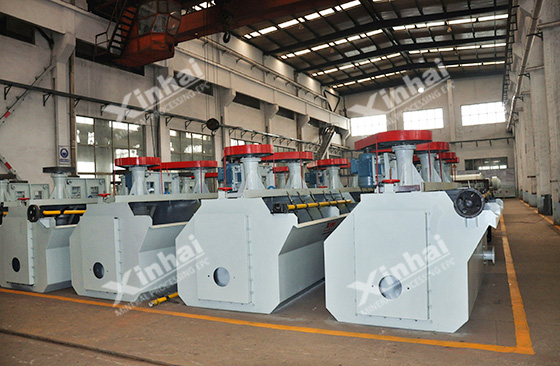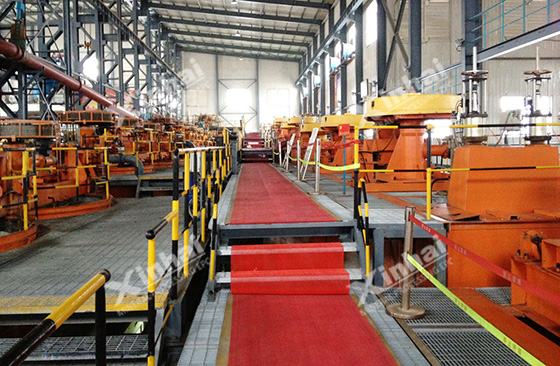Causes and Solution of Flotation Impeller Wear of Flotation Cell

The flotation separation process has become one of the most important mineral processing methods in the world. And the flotation cell, important equipment in the flotation separation process, can be divided into two categories: mechanical flotation cell, flotation column and reactor/separator flotation equipment. But at present, mechanical flotation cell is widely used in the flotation separation plant, and the impeller system is one of the important working components of the mechanical stirring flotation cell, which is the core of the flow component. According to the direction of the liquid flowing out from the impeller, the impeller of the flotation cell can be divided into three types: centrifugal flotation impeller, mixed-flow flotation impeller and axial flotation impeller.
However, due to long-term exposure to flotation reagents and slurry erosion, the flotation impeller become one of the vulnerable parts of the flotation cell, which makes some important parameters of the flotation cell itself changes, such as the clearance between the impeller and the stator, between the stator and cover plate is larger, thus affecting the inflating volume and uniformity of flotation cell, deteriorating the flotation effect, and increasing the maintenance of flotation cell. Therefore, it is necessary to understand the cause of flotation impeller wear and then take some measures to solve it.

One. Cause of flotation impeller wear for the flotation cell
1. Erosive wear
The solid particles mixed in the slurry impact the overcurrent surface, resulting in the successive elastic deformation and plastic deformation of the material surface. After the repeated impact by solid particles, the material is destroyed then the surface material falls off. There are scratches and pitting along the flow direction when wear is slight; there are corrugate and groove trace on the surface when the wear is serious, even the parts can be perforated, and collapses as a block when the wear is too severe.
2. The combined action of cavitation wear and erosion wear
When the flotation impeller rotates, the pulp will be removed and forms the air pressure, produces the bubble. There are three main ways to produce bubbles. The flotation impeller rotates to discharge the pulp, forming the excess pressure and producing the bubble. the air dissolving in the pulp is inhaled to form bubbles in the zone of negative pressure. After the bubble is formed, it moves along with the pulp, and the bubble that comes into contact with the inner wall of the flotation impeller collapses due to the rising pressure, thus forming a microjet to the inner wall. This micro jet finishes the directional impact on the material surface in a very short time, and the force generated is equivalent to the action of “water hammer”.
The metal surface is gradually worn off due to impact, resulting in material loss. The solid particles in the pulp are driven by cavitation and impact on the metal surface, which is the combined effect of cavitation wear and impact wear.

Two. Improvements on the flotation cell wear
1. Change outlet angle of the blade
Considering the wear, the thickness of the inlet edge of the blade is generally larger. For the medium with strong corrosivity (such as flotation feed), adopting a smaller outlet angle can minimize the impact of particles on the working face of blade. Generally, the blade outlet angle of the flotation cell is 30°-40°.
2. Width of blade outlet
In order to reduce the wear of flotation cell, increasing the width of the blade outlet can reduce the relative velocity at the impeller outlet and the flotation impeller wear, decrease the efflux-wake effect at the impeller outlet, make the distribution of pulp velocity uniform.
3. Number of impeller blade
The number of impeller blades is generally 4~7. Fewer impeller blades can reduce congestion at impeller inlet, thus reducing the wear of the slurry pump.
4. Particle size and hardness of solid particles
The particle size and hardness of solid particles in pulp are important factors affecting the wear of impeller materials. The increase of particle size and hardness will lead to an increase in erosion size. Therefore, in the daily working process of the flotation cell, the particle size of the flotation feed shall be strictly controlled to reduce the wear of the flotation impeller.

The above are the reasons for the wear of the flotation impeller and the measures to reduce the wear. In addition to changing the parameters of the floater impeller and feeding size, the quality of the floatation impeller itself is also an important factor to increase the service life of the floatation impeller. It is suggested to choose the flotation cell manufacturer with the overall qualification of the concentrator to buy the flotation cell, so as to ensure the quality of the flotation cell and choose the equipment more in line with the scale of the concentrator, thus reducing the processing cost and improve the return on investment.




